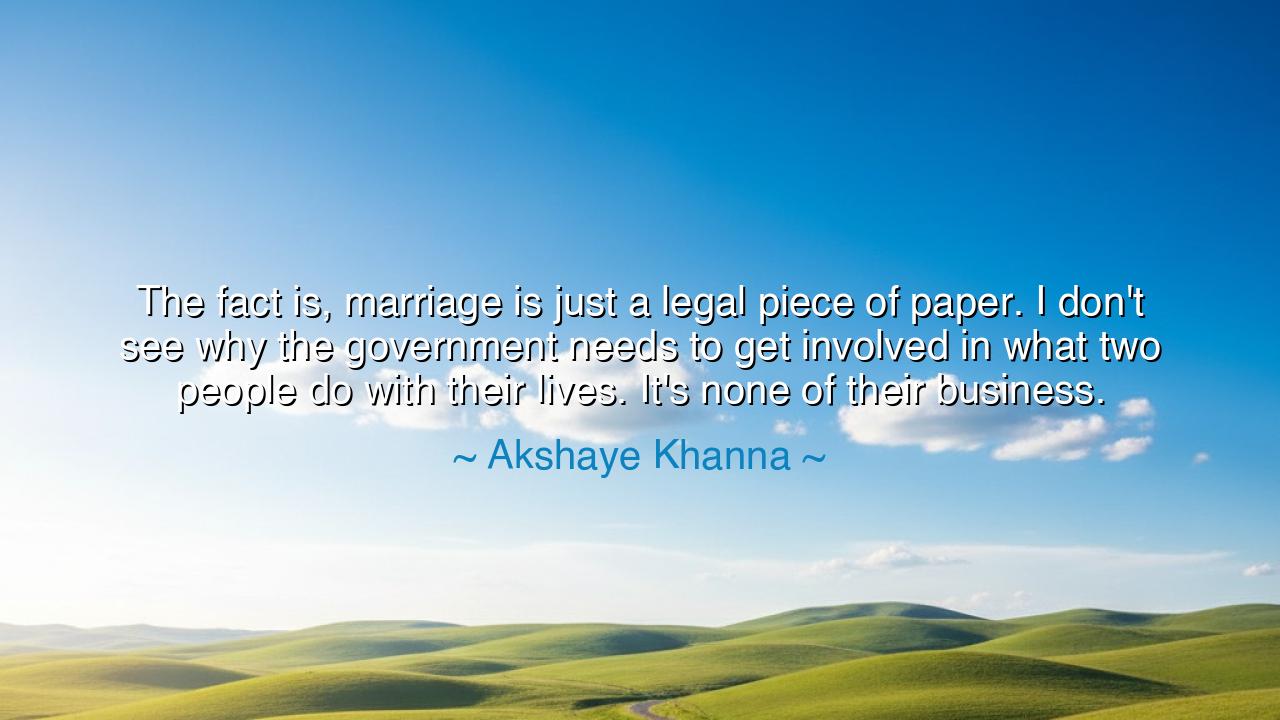
The fact is, marriage is just a legal piece of paper. I don't see
The fact is, marriage is just a legal piece of paper. I don't see why the government needs to get involved in what two people do with their lives. It's none of their business.






When Akshaye Khanna said, “The fact is, marriage is just a legal piece of paper. I don't see why the government needs to get involved in what two people do with their lives. It's none of their business,” he spoke not as a cynic, but as a seeker of truth — one who questioned the boundaries between love, freedom, and authority. Beneath his calm defiance lies a profound challenge to the way society binds the most intimate of human bonds to the machinery of the state. His words echo the eternal tension between the heart and the law, between personal choice and collective control. He reminds us that love, that most sacred of forces, was born before governments existed and will endure long after they fade.
In the style of the ancients, one might say that Khanna spoke as a philosopher of the inner life. His words call us to remember that love, at its essence, belongs to the realm of the spirit, not the ledger of bureaucracy. He asks us to look past the “legal piece of paper” and ask what truly sanctifies a union — is it the signature of the state, or the sincerity of two souls who choose to walk through life together? The ancients would answer, as poets and mystics have through the ages, that true marriage is not written on parchment, but upon the heart. For love is not a transaction to be witnessed by law; it is a sacred covenant known only to those who dwell within it.
The origin of this quote reflects Khanna’s characteristic independence of thought, often expressed in his interviews and reflections on life and society. Living in a world where marriage is often entangled with expectation, social approval, and legal formality, he offered a radical simplicity — that love requires no external validation. His view was not an attack on marriage itself, but on its institutionalization. He questioned why something as private as affection and companionship should require government oversight, as if love were a license rather than a human right. His statement belongs to a lineage of thinkers — from Henry David Thoreau to Leo Tolstoy — who questioned the need for laws to regulate what is sacred within the soul.
To understand his meaning, consider the ancient tale of Antony and Cleopatra. Their love was vast and defiant, bound not by decree but by devotion. Though no law recognized their union, their story has outlived empires. History may call their love tragic, but its truth lies in its freedom — in the refusal to let convention dictate the terms of the heart. Like Khanna, they remind us that love does not require permission; it demands authenticity. The state may record marriages, but it cannot create them. It may dissolve them, but it cannot erase what two hearts have written in courage and trust.
Yet Khanna’s words carry not rebellion alone, but wisdom about responsibility. To say that marriage is “just a legal piece of paper” is not to dismiss the value of commitment — it is to remind us that commitment must come from within, not from the compulsion of law or tradition. The true test of love is not found in contracts, but in constancy; not in ceremonies, but in care. The legal form of marriage can protect, but it cannot sustain. What sustains is understanding, loyalty, and choice renewed each day — the quiet decision to stand beside another human being through the changing seasons of life.
The ancients would tell us that all laws are but shadows of higher truths. Love belongs to that higher realm. When governments and societies intrude upon it — dictating who may marry, how they must marry, or when they must part — they violate something sacred. The heart cannot be legislated; its freedom is its purity. When Khanna says, “It’s none of their business,” he is defending this sacred autonomy — the right of every soul to define its own bonds, its own loyalties, and its own meanings without fear of judgment or interference.
The lesson of his words is timeless: do not mistake form for substance, or legality for love. A signature may bind two names, but it cannot bind two spirits. The truest unions require no witness but the soul itself. Yet his message also carries a call to integrity — if love is to exist beyond law, it must be built on trust, respect, and freedom freely given. Let your relationships be grounded not in obligation, but in choice; not in fear of breaking rules, but in the joy of honoring promises.
So, remember this teaching: love needs no certificate, only truth. The paper may fade, but the promise endures in the hearts of those who keep it. Governments may govern nations, but only love governs the soul. And in the end, the bonds that matter most are not written in ink, but carved in the quiet faith between two human beings — unseen by the law, but forever visible to eternity.






AAdministratorAdministrator
Welcome, honored guests. Please leave a comment, we will respond soon